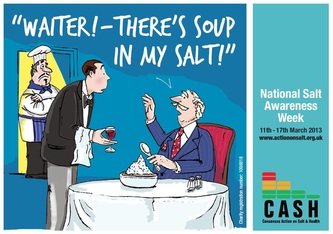 For hundreds of thousands of years, humans evolved on a diet that contained just a trace of salt. The Yanomamo Indians of the Amazon basin were first studied by Western society in the 1950s and provide an insight into what happens to blood pressure when salt consumption is extremely low. In the 1950's the Yanomamo were consuming a primative diet that contained <1g of salt a day. The most striking feature of this diet was that the blood pressure in the older Yanomamo was the same as that in the adolescents. Salt is ubiquitous in food with 75% of daily salt intake hidden in processed food. There is abundant evidence from clinical trials indicating that a usual salt intake (3-4.5g per day) has adverse effects on the heart and blood vessels. A high salt diet predisposes to high blood pressure which leads to stroke and heart failure. A recent study looked at 17 mildly hypertensive adults randomised to 4 weeks of reduced (1.2-1.5g) or usual (3.6g) salt intake. BP pressure fell by 12mmHg and vascular function improved in subjects receiving the low salt diet. In this study the reduction in blood pressure caused by reducing salt intake is similar to the amount normally achieved by blood pressure medication. It would be difficut to follow a Yanomamo diet but dietary salt reduction is possible by following the DASH (Dietary Approaches to Stop Hypertension) diet which reduces salt intake by about 50%. Implimentation of low salt diets requires action by politicians, food companies and retailers, as well as consumers. If salt intake could be reduced by 50% it is estimated that in the USA this would lead to 90,000 fewer heart attacks, 48,000 fewer strokes and save $18 billion each year. We have known about the associaion between salt intake and blood pressure for many years and the evidence is growing to support a reduction in salt consumption to bring about positive health benefits. Pressure groups such as the Consensus Action on Salt and Health are trying to persuade all stakeholders to reduce salt and have made some important progress. Watch out for Salt Awareness Week (11-17th March 2013). Jablonski KL. Racine ML. Geolfos CJ. Gates PE. Chonchol M. McQueen MB. Seals DS.
Dietary Sodium Restriction Reverses Vascular Endothelial Dysfunction in Middle-Aged/Older Adults With Moderately Elevated Systolic Blood Pressure J Am Coll Cardiol. 2013;61(3):335-343. doi:10.1016/j.jacc.2012.09.010 Oliver WJ. Cohen EL and Neel JV. Blood pressure, sodium intake, and sodium related hormones in the Yanomamo Indians, a "no-salt" culture. Circulation. 1975 Jul;52(1):146-51.
2 Comments
|
Dr Richard BogleThe opinions expressed in this blog are strictly those of the author and should not be construed as the opinion or policy of my employers nor recommendations for your care or anyone else's. Always seek professional guidance instead. Archives
August 2023
Categories
All
|

 RSS Feed
RSS Feed

